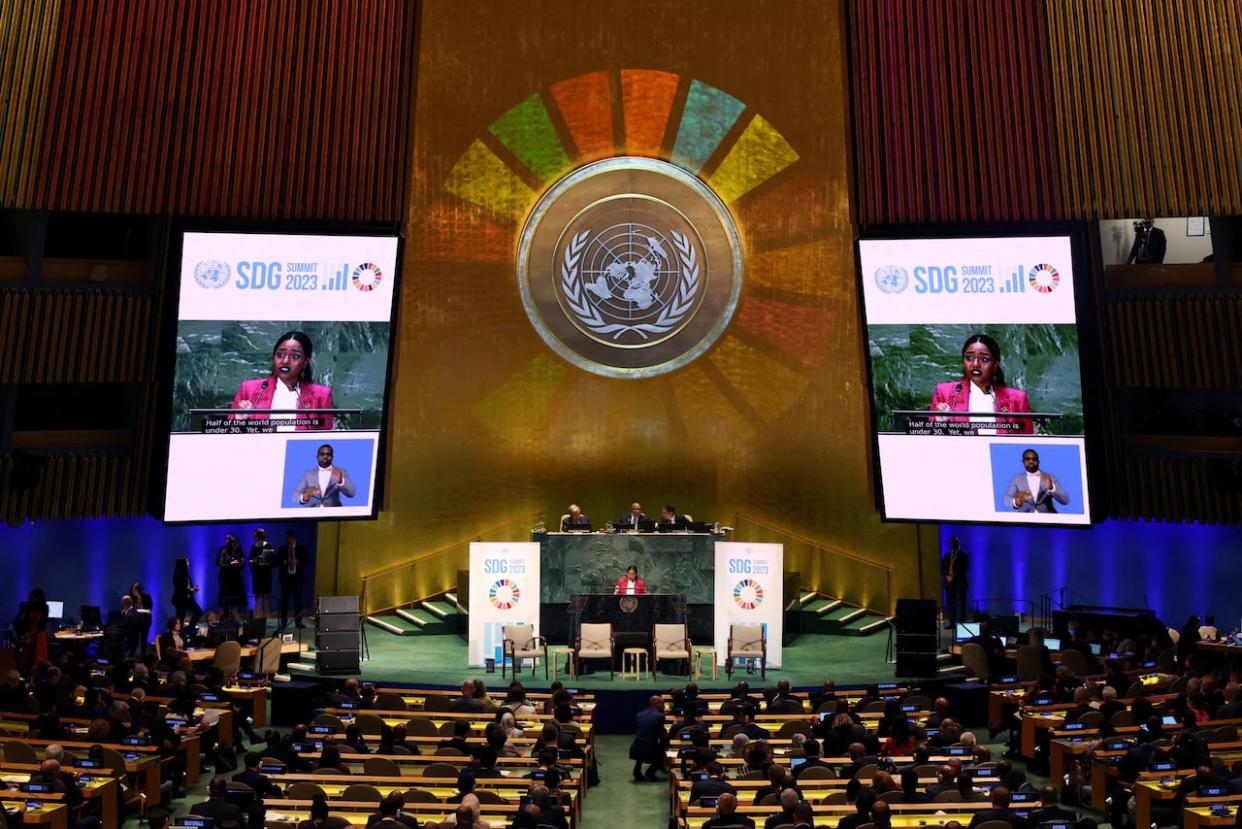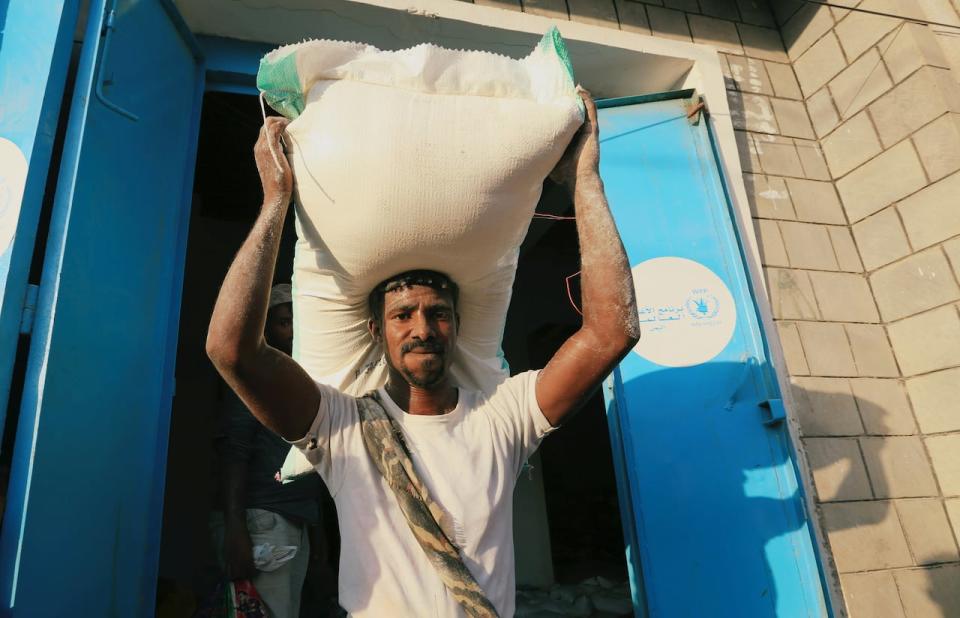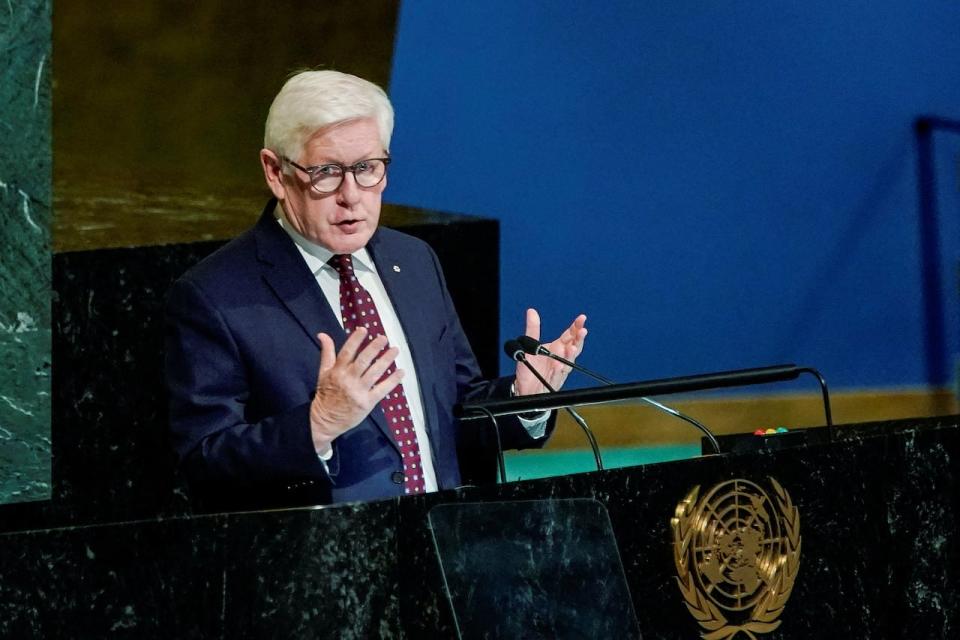After dismal start, UN hosts 'halftime summit' in bid to save development plan

It's being billed as a halftime summit. And as world governments gather at the United Nations this week, the scoreboard at the half looks ugly.
The current UN General Assembly marks the midway point in a 15-year pledge to meet a series of human-development targets by 2030.
There's no doubt humanity took its lumps in the first half.
Since countries set out 169 targets in 17 areas under the Sustainable Development Goals (SDG) in 2015, the results are uninspiring: 15 per cent are on track to succeed, 48 per cent are moderately or severely off track, and 37 per cent are stuck or getting worse.
"It's abysmal. It's a sobering fact," said Amina Mohammed, the UN deputy secretary-general, told reporters.
"It is a failure of ours."
And when UN officials say it's a failure of "ours," they mean it's a failure of the 193 countries, rich and poor, that came here to make those pledges, and then didn't back them up.
But it's not all gloom.
Internet access, one of the targets, is up 66 per cent since 2015. Extreme poverty was declining for decades, and it's declining again after the pandemic wiped away three years' worth of gains. New land and sea areas have been protected.
Quartet of calamities
And, if searching for a silver lining, here's one: The number of targets that have seen progress, even slow progress, easily outnumbers the worsening areas.
But that progress was overwhelmed by a quartet of calamities. The pandemic; the invasion of Ukraine and its impact on food prices; a funding gap; and failures in governance, in an era of democratic backsliding.
The result is dismal trendlines in myriad areas. Schools were battered by the pandemic. As for gender equality, it'll take 300 years, at this pace, to end child marriage. On climate change, emissions are still rising, and the UN head has dubbed this the era of global boiling.

War, the pandemic, poor governance, and funding shortfalls have derailed global anti-poverty targets. Seen here, a worker carries a sack of wheat flour at a United Nations aid distribution center in Yemen in 2018. (Abduljabbar Zeyad/Reuters)
In the runup to the summit, Canada's UN ambassador pushed back against what he views as excessively negative talk.
Bob Rae called it self-defeating.
"I'm very much a glass half-full, or even a quarter-full, person," Rae told CBC News, regarding the summit. "Yes, of course the situation is critical all around the world. There's many serious conflicts…. We won't get there if we just sit around, you know, rubbing our hands saying, 'It's terrible.' … Yeah, okay. Things are not good, things are tough.
"But our job is not simply to talk about how tough it is. Our job is to talk about: What can we do? … There's too much negativity out there, and negativity doesn't really help you solve problems. And we've got to be in a problem-solving mode in this institution."
Prime Minister Justin Trudeau will be in New York City for the summit through Thursday, discussing development, climate change, Haiti and Ukraine.
At this summit, countries have reaffirmed their commitment to the SDG project, which endorses what Secretary-General Antonio Guterres calls a stimulus plan.

Ukrainian President Volodymyr Zelenskyy visits the Staten Island University Hospital, where Ukrainian soldiers are being treated for war injuries, in New York, on Monday. (Brian Woolston/Reuters)
It includes calls for a $500 billion US increase in wealthy-nation funding for development, better co-ordination with private-sector investors, and, in the wake of surging interest rates, slower debt repayment schedules.
The UN says countries never sufficiently funded the pledges they made. Indeed, the Organization for Economic Cooperation and Development suggests countries would need to double the $4 trillion they spend on these priorities in order to meet them.
Money alone won't solve this
But one UN-monitoring group says upping dollar figures isn't the only answer. It says countries need better governance — more transparent, accountable government.
In other words, more democracy.
An IMF paper a few years ago estimated that just bribery cost countries up to $2 trillion US, or two per cent of the global GDP.
Another IMF paper this year concluded that democracies generally outperform autocracies in weathering an economic storm.
And democracies generally stopped spreading nearly two decades ago, with autocracy expanding to several developing countries in just the last few years.

Canadian Ambassador to the UN Bob Rae, seen here in 2022, says he's trying to stay optimistic because pessimism is pointless. (Eduardo Munoz/Reuters)
Eighty-five per cent of the world's people live in countries where fundamental freedoms of assembly and expression are curtailed, and people who push their government over corruption, rights abuses or economic failures wind up persecuted, says Mandeep Tiwana.
"It's going to take much more than [money]," said Tiwana, a human-rights lawyer and chief programs officer at the civil-society advocacy group Civicus.
"The crisis of the SDGs is actually a crisis of democracy. It's a crisis of humanity. … [Funding is] important. But … if you don't have civic and democratic freedoms, all of those public funds that will be released will be used up to support networks of patronage, to shore up repressive state apparatuses."
He notes that two of the five most powerful countries on the UN Security Council are autocracies, China and Russia.
Neither Russia's Vladimir Putin nor China's Xi Jinping will be here. In fact, with the president of France and the U.K. also absent for different reasons, only one of the five Security Council leaders is present at this year's General Assembly: U.S. President Joe Biden.
But Ukrainian President Volodymyr Zelenskyy will be there, speaking to the General Assembly on Tuesday and then to the Security Council in a Wednesday debate on Ukraine.
He could come face to face with the foreign minister of Russia, Sergei Lavrov, in a potentially powerful moment.
Which speaks to another challenge this week: How to focus on human development, in the midst of so much tension on multiple fronts.
No 'physical blows'
The Ukrainian leader, surely, will make the case that all these things are connected, tying Russia's invasion to rising fuel and food costs.
Mohammed said she's happy this conversation, heated as it might be, will happen at the UN; since the invasion, she said, countries have been living in echo chambers, speaking to like-minded allies.
"But frankly, that was not the reality. The reality is here. It's messy," she said. "We're also hopeful that perhaps this is the place, where you've got these face-to-face meetings, that we can bring more solutions."
The Canadian ambassador says it could be uncomfortable — and should be. He said Lavrov needs to hear from others about the damage done by his country's invasion.
"We're not going to come to physical blows," Rae said.
"You're not going to threaten people physically, but people need to understand. I think it's a time for candor and I think it's a time for directness in our diplomacy."


